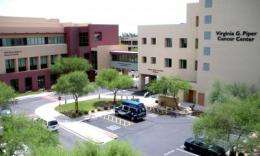New drug aims to 'seek and destroy' many types of cancer

A new drug designed to "seek and destroy" common cancers such as breast, prostate, endometrial, pancreatic, ovarian, skin and testicular cancers is being tested at TGen Clinical Research Services (TCRS) at Scottsdale Healthcare.
The Phase 1 clinical trial will help determine if EP-100 is safe and effective for use among patients with solid cancer tumors, with fewer side effects than chemotherapy or radiation treatment.
TCRS is a partnership of the Translational Genomics Research Institute (TGen) and Scottsdale Healthcare. The partnership allows molecular and genomic discoveries made by TGen and others around the world to reach the patient bedside in the Virginia G. Piper Cancer Center at Scottsdale Healthcare as quickly as possible through clinical trials with agents directed at specific targets in patients' tumors.
According to Ramesh K. Ramanathan, MD, principal investigator for the trial in Scottsdale, the drug is a membrane-disrupting peptide (tMDP) designed to "seek and destroy" cancer cells by targeting those with excessive luteinizing hormone releasing hormone (LHRH) receptors.
Excessive LHRH receptors are found in a wide range of cancers, including breast, prostate, endometrial, pancreatic, ovarian, skin and testicular cancers.
Mike Janicek, MD, a Gynecologist Oncologist who practices at the Virginia G. Piper Cancer Center at Scottsdale Healthcare said, "I am looking forward to participating in the study with EP100, especially for ovarian and uterine cancer patients. Often patients with advanced cancer will need new therapies and a targeted treatment like EP100 is the next frontier of research."
The study is designed to evaluate the safety of EP100 and will enroll as many as 36 adult patients with solid tumors whose tumor biopsies indicate that they have excessive LHRH receptors.
EP-100 will be administered intravenously for three out of four weeks. Once the maximum tolerated dose has been established, additional subjects with specific diagnoses of either breast, ovarian, endometrial, pancreatic or prostate cancer will be enrolled. EP-100 is produced by Esperance Pharmaceuticals of Baton Rouge, La., and was culled from a range of drugs tested at TGen Drug Development Services (TD2) in Scottsdale.
"It brings with it a killer, a toxin. It's a way of targeting a toxin to the cancer tumor cells,'' said Dr. Steve Gately, president and chief scientific advisor at TD2. "Our goal would be to find that set of patients who are highly responsive; who have the greatest benefit. We'd like to accelerate the government approval for that agent.''
The clinical trials could show that EP-100 is effective with certain types of cancer, Dr. Gately said. "Perhaps there is a genetic context under which certain patients may be more responsive. We want to find those patients.''
Dr. Hector Alila, president of Esperance, said EP-100 has the potential to offer an improved safety and effectiveness over existing therapies, such as radiation or chemotherapy.
"Preclinical studies of EP-100 demonstrated this candidate's efficacy across multiple indications in oncology, including aggressive cancers known to be resistant to the current standards of care and, importantly, studies of EP-100's mechanism-of-action support that it targets and selectively kills cancer cells without harming normal cells," Dr. Alila said.
Source: Scottsdale Healthcare















